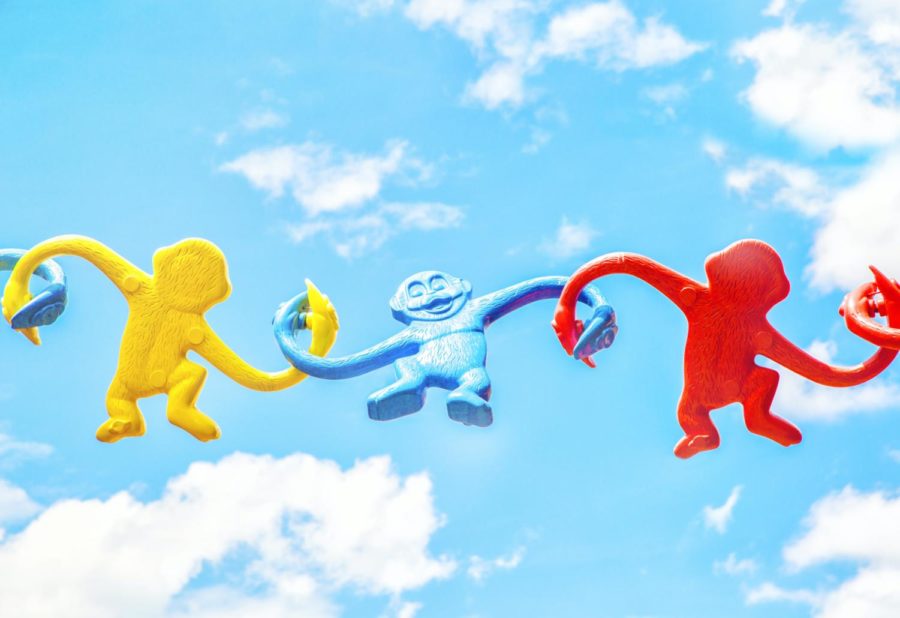Ziemann: Adults should play too (but not in the way you think)
October 22, 2020
A couple of days ago, Alexandria Ocasio-Cortez streamed Among Us on Twitch with some other popular creators to get out the vote. On the renowned streaming day, I wasn’t doing the best mentally and decided to take some time for myself instead of watching. However, I’m writing this to the sound of highlights videos because listening to people have fun makes me feel better.
There’s something to be said about having fun. Play is one of the simplest ways to boost happiness chemicals like serotonin and dopamine in the brain, and it is deeply important for young children as they learn to be humans.
According to the Journal of the American Academy of Pediatrics, play has been recognized by the United Nations as a fundamental right for every child. Why? Because play encourages children to be creative while exploring the limits of themselves and the world around them.
Children experience six stages of play, suggests Pathways, a free online resource for parents that helps them track their child’s development throughout their first six years of life.
The first is unoccupied play, the shortest yet arguably most influential stage, lasting from birth to around 3 months. In this stage, babies move around and learn how their body works.
Next, babies grow into toddlers and play alone from 3 months to 2 years old. Toddlers aren’t interested in playing with other children quite yet, but they are interested in watching. This watching eventually turns into parallel play, where a toddler plays next to other children but does not interact with them just yet.
Associate play begins around age 3. During associate play, children interact with one other, but not as much as older kids. Children between the ages of 3 and 4 may work on the same projects, color the same pictures, play on the same playground equipment or do the same crafts but the play is still largely focused on the self.
Around the age of 4, children enter into the final stage of play called cooperative play. This is the play we probably remember doing as kids: working with other children to create imaginative worlds, playing together. This type of play is definitely the most complex, but children playing cooperatively make friends and learn about teamwork, sharing and compromise.
According to Pathways, play should be a part of a child’s daily routine because play can help children meet important developmental milestones like crawling, talking and drawing.
But, what is it? Peter Gray, psychologist and contributor to Psychology Today, defines play as a self-chosen and self-directed activity that is more about the imaginative experience than the actual end result.
Gray’s definition says nothing about play being just for children.
Because it’s not.
In 2015, the Wu Tsai Neurosciences Institute at Stanford reported the opposite of play is not work. It’s depression. Humans are designed to be perpetually juvenile, and play is a survival instinct that can help us regulate our emotions. When we lose play, we become more susceptible to — you guessed it — unregulated, often harmful emotions.
You’ve probably heard of rumination before — and if you haven’t, chances are you know what it is anyway. When people ruminate, our brains are like a hamster running around in a wheel. We hyperfocus on one or two negative things and can’t stop thinking about them. Rumination is the next step after worry. It’s a sign of unregulated emotion, and it may be a symptom of a deeper mental issue like depression or anxiety.
The COVID-19 pandemic has led to an increase in mental health difficulties in adults across the United States, according to the Centers for Disease Control and Prevention. It’s obvious most of us have had some kind of stress in our lives related to the pandemic, but it’s more serious than you may think.
In June, 40.9 percent of adults in the United States reported at least one adverse mental or behavioral health condition. This is three times the number reported in 2019.
When we play, we can sort out these not-so-great emotions in a healthy way. Playing helps us cope.
You don’t have to break out the Legos again. Play can be dancing to a song, hanging out with friends or making something new for dinner. Play is what you make of it.
If watching a congressperson messing around with a silly little game on a streaming platform makes you happy, do it. We all need some time to play.
No matter what you do, do it more. School is hard. Life is hard. Spend more time doing things you love.
Because we only live once. Why spend life worrying?







